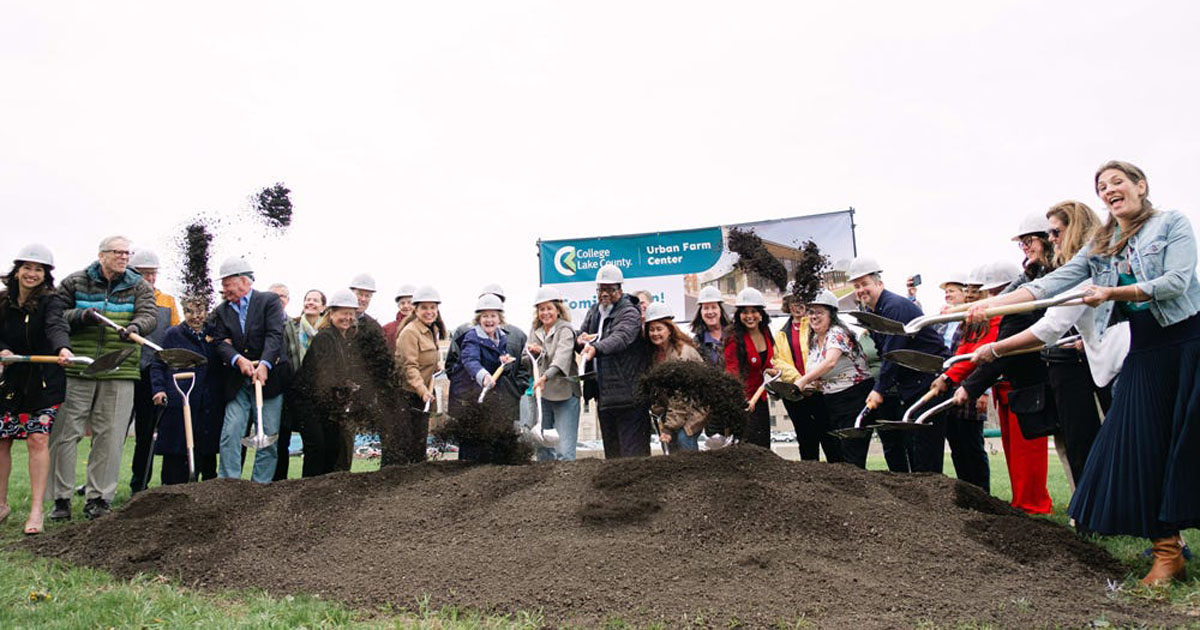By John F. Wasik
In Lake County, you don’t have to go far to see tight rows of corn or soybeans in the growing season. Although this is a traditional picture of modern agriculture, it’s being challenged by climate change.
Intense storms and flooding are undermining agriculture in a profound and disturbing way. In an era of global warming, vast amounts of topsoil and agricultural chemicals are being washed into our watersheds (and oceans) or turned into dust. Moreover, conventional tilling of commodity crops like corn is making soil erosion worse: A pound of topsoil is lost for every bushel of corn produced. Witness the recent dust storm in the Chicago area. That was dry topsoil blowing away. Shades of the 1930s Dust Bowl years.
Which brings us, happily, to Lakeside Campus of the College of Lake County (CLC) in Waukegan. Its Urban Farm Center, supported by public funds and generous private donations, will feature indoor hydroponic farming. Not only will the amount of water, light and nutrients be closely controlled, urban farmers and entrepreneurs will be trained there. The food produced will be sold to the public, which will be a boon to downtown Waukegan. The facility is expected to be completed in December, 2026.
The emerging reality that we will need to be growing food in climate-controlled, chemical-free, interior vertical urban spaces is something that is taking shape daily. One of the most precious resources on our planet isn’t necessarily lithium, oil or gold: It’s fertile topsoil infused with sustainable amounts of nutrients and water. If we can’t grow enough plants to feed our growing population, we’re imperiled.
More importantly, other than creating career paths in an underserved community, CLC’s 24,000 square-foot Urban Farm Center will be a vibrant learning hub and destination. Facing Lake Michigan a block away, it’s accessible by public transit. You can walk to the Metra commuter train station and PACE bus stops. Even the Waukegan beach and marina are accessible from here.
“Our vision is to ensure this facility becomes a vibrant, thriving resource for everyone,” said Eliza Fournier, director of the center. “A place where we not only grow food, but we grow people, opportunities and a stronger, healthier community.”
As a community hub, the urban farm center will play an outsized role in revitalizing and feeding Waukegan. “This space will provide fresh, nutritious, locally grown food right here in our city,” said Jesse Ruiz, dean of the CLC Lakeshore campus. “But more than that—it will nourish the spirit of our community.”
Downtown Waukegan used to be a bustling industrial and retail hub, home to Ray Bradbury and Jack Benny. By giving new life and purpose to vacant lots and unoccupied buildings across the urban landscape, interior agriculture addresses some persistent needs such as healthy nutrition. Consider these facts:
– Only 10% of Americans consume the required minimum daily requirement of fruits and vegetables. As a society, we need to move away from sugary, ultra-processed foods. A healthier diet will address the growing incidence of diabetes, cardiovascular disease and obesity.
– Food insecurity can be tackled by growing more food locally in places like Waukegan. Despite vast fields of corn, soybeans and livestock, Illinois grows only 4% of its produce. As other places (like California and Florida) experience more violent weather and drought, indoor growing spaces are becoming essential.
– People can live longer with better, more nutritious food. Life expectancy is 11 years longer for residents living a few miles south of Waukegan. Zip codes shouldn’t determine who has access to the freshest, healthiest food.
Local agriculture also lowers the carbon footprint of food production. Instead of shipping berries and avocados from Mexico in the winter, can we grow them in Northern Illinois?
As with anything relating to social ecology, we’re part of a web of life that creates food and nourishes civilization. Rethinking agriculture involves re-examining our relationship with how we grow, distribute and eat food. In order to live long and healthy lives, we need a healthy environment for what nourishes our bodies most.
“If you eat, you are involved in agriculture,” observes Wendell Barry, a farmer, poet and philosopher. We’re all part of this process.”
John F. Wasik is a Lake County Commissioner, environmentalist, author of 19 books and publisher of the Substack newsletter “Refinement.” The opinions expressed are his own.

